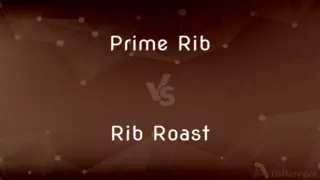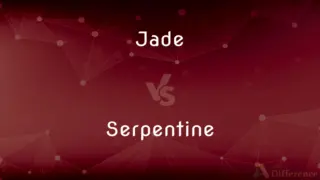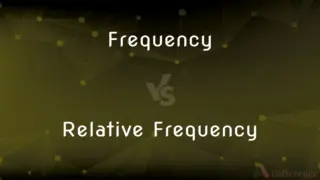Aether vs. Nether — What's the Difference?
By Tayyaba Rehman — Updated on October 28, 2023
Aether traditionally refers to the upper sky or heavens, often seen as a mythical substance. Nether relates to what's below, especially the underground or infernal regions. They signify opposing vertical realms.

Difference Between Aether and Nether
Table of Contents
ADVERTISEMENT
Key Differences
Aether, in ancient and medieval cosmology, is often conceived as the element or realm that fills the upper regions of space. Historically, it was believed that the universe was made up of this unique substance, especially the regions beyond our terrestrial sphere. This belief was rooted in the idea that a certain medium filled the vastness of space, allowing celestial bodies to move.
On the other hand, Nether is a term that denotes the lower regions or something located beneath. It carries with it connotations of the underworld or regions deep below the surface. In certain mythologies or theologies, the netherworld can be an infernal realm, a place of the dead, or simply an underground domain.
Aether has also been perceived as a sort of ethereal medium that permeates space, believed by some to be necessary for the transmission of electromagnetic waves. This classical concept was eventually rendered obsolete with the advent of the theory of relativity.
In contrast, Nether, especially in modern contexts, often has less of a scientific or philosophical implication and is more so used in literary or gaming contexts, such as the "Nether" in the game Minecraft, representing a dangerous and fiery underworld.
Essentially, while Aether speaks to what's above, encompassing the heavens and the celestial, Nether addresses what's below, often suggesting the underground, the infernal, or the unseen depths.
ADVERTISEMENT
Comparison Chart
Origin
Ancient and medieval cosmology
Old English origins describing what's below
Represents
Upper sky, heavens, or a celestial substance
The underworld, beneath, or lower regions
Historical Use
Believed to fill the universe and aid celestial movement
Often linked to the underworld or subterranean realms
Modern Context
Less common, sometimes used in fiction or alternative theories
Popular in literary and gaming contexts
Connotation
Ethereal, celestial, heavenly
Infernal, underground, beneath
Compare with Definitions
Aether
A pleasant, heavenly scent.
The fragrance reminded her of the Aether, lifting her spirits.
Nether
Located beneath or below; lower or under.
The explorers ventured into the nether regions of the cave.
Aether
An ethereal essence or spirit.
Some believe that the soul rises into the Aether after death.
Nether
Underlying or fundamental.
The nether principles of the philosophy were hard to grasp.
Aether
The upper sky, space, or heavens in ancient cosmology.
The ancient Greeks believed the stars moved through the Aether.
Nether
Of or relating to the world of the dead.
The hero journeyed to the nether realms to rescue his love.
Aether
A supposed medium occupying all space, postulated to account for the propagation of electromagnetic radiation through space.
Scientists once thought light needed an Aether to travel through space.
Nether
Inferior or second-rate.
He was relegated to the nether tiers of the organization.
Aether
A mythical fifth element, apart from earth, air, fire, and water.
Alchemists pondered over the elusive qualities of the Aether.
Nether
Located beneath or below; lower or under
The nether regions of the earth.
Aether
The poetic personification of the clear upper air breathed by the Olympians.
Nether
Lower; under.
The disappointed child’s nether lip quivered.
Aether
Alternative spelling of ether
Nether
Lying beneath, or conceived as lying beneath, the Earth’s surface.
The nether regions
Aether
See Ether.
Nether
Down; downward.
Aether
Personification of the sky or upper air breathed by the Olympians; son of Erebus and Night or of Chaos and Darkness
Nether
Low; low down.
Aether
A medium that was once supposed to fill all space and to support the propagation of electromagnetic waves
Nether
To bring or thrust down; bring or make low; lower; abase; humble.
Nether
To constrict; straiten; confine; restrict; suppress; lay low; keep under; press in upon; vex; harass; oppress.
Nether
To pinch or stunt with cold or hunger; check in growth; shrivel; straiten.
Nether
To shrink or huddle, as with cold; be shivery; tremble.
Nether
To depreciate; disparage; undervalue.
Nether
Oppression; stress; a withering or stunting influence.
Nether
(mining) A trouble; a fault or dislocation in a seam of coal.
Nether
Situated down or below; lying beneath, or in the lower part; having a lower position; belonging to the region below; lower; under; - opposed to upper.
'Twixt upper, nether, and surrounding fires.
This darksome nether world her lightDoth dim with horror and deformity.
All my nether shape thus grew transformed.
Nether
Lower;
Gnawed his nether lip
Nether
Of the underworld;
Nether regions
Nether
Located below or beneath something else;
Nether garments
The under parts of a machine
Nether
Situated down or at a lower level.
She wore a long dress that covered her nether limbs.
Common Curiosities
Was Aether only believed in by the Greeks?
No, while prominent in Greek cosmology, similar concepts existed in other cultures too.
Is Aether considered a real substance in modern science?
No, the idea of Aether as a medium for light propagation has been discredited with the theory of relativity.
Can Nether be used in everyday conversation?
Yes, as in "nether regions" referring to the lower parts of something.
Why was Aether believed to exist?
It was postulated to explain how light and electromagnetic waves traveled through empty space.
Does Aether have any relation to ether used in chemistry?
While phonetically similar, they are distinct. Ether in chemistry refers to a class of organic compounds.
Is Aether ever used in fiction?
Yes, Aether is often used in fantasy and science fiction to describe mystical substances or realms.
How can Nether be used grammatically?
Nether is an adjective, as in "nether regions" or "nether world."
Are there any alternative spellings for Aether?
Yes, it can also be spelled "ether," though context determines its meaning.
Does Nether always refer to something sinister or evil?
No, while Nether can refer to the underworld, it broadly means "below" or "underneath."
Is the term "Netherworld" synonymous with "Hell"?
Not always. "Netherworld" generally means the underworld or realm of the dead; it doesn't always have the same connotations as "Hell."
Is the "Nether" in Minecraft the same as the historical concept?
Not exactly. While it's an underworld, it's a fictional creation with its own unique attributes.
Is Aether ever used outside of cosmology or fiction?
Yes, it can refer to the sky or heavens in poetry or a heavenly scent in some contexts.
Is "Nether" related to the Dutch city "Netherlands"?
No. While both involve the concept of "low" or "below," they have different etymological origins.
Can Aether be used metaphorically?
Yes, it can symbolize the heavens or something sublime and elevated.
Are there any famous stories or myths involving the Nether?
Many cultures have myths about underworlds or nether regions, such as the Greek Hades or the Norse Hel.
Share Your Discovery

Previous Comparison
Gabbro vs. Granite
Next Comparison
Impractical vs. PracticalAuthor Spotlight
Written by
Tayyaba RehmanTayyaba Rehman is a distinguished writer, currently serving as a primary contributor to askdifference.com. As a researcher in semantics and etymology, Tayyaba's passion for the complexity of languages and their distinctions has found a perfect home on the platform. Tayyaba delves into the intricacies of language, distinguishing between commonly confused words and phrases, thereby providing clarity for readers worldwide.















































